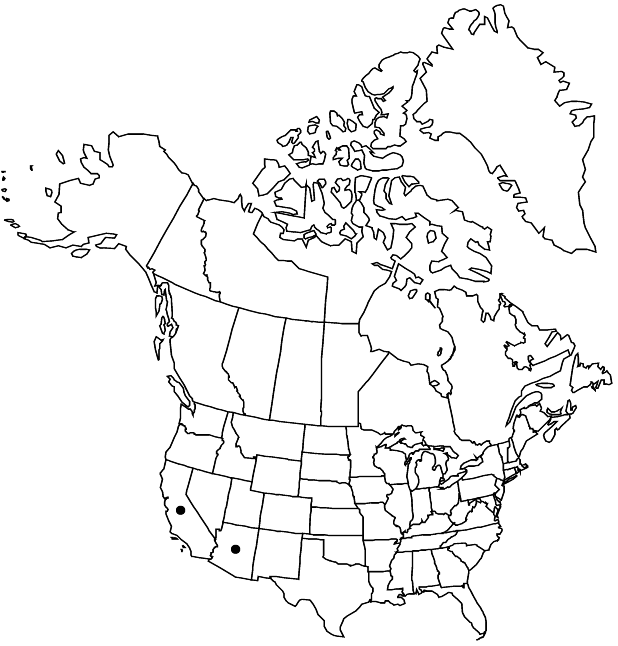Difference between revisions of "Dudleya saxosa"
New N. Amer. Crassul., 15. 1903 ,.
FNA>Volume Importer |
RevisionBot (talk | contribs) m (Bot: Adding category Revised Since Print) |
||
| (5 intermediate revisions by 3 users not shown) | |||
| Line 7: | Line 7: | ||
}} | }} | ||
|common_names=Panamint dudleya | |common_names=Panamint dudleya | ||
| + | |special_status={{Treatment/ID/Special_status | ||
| + | |code=E | ||
| + | |label=Endemic | ||
| + | }} | ||
|basionyms={{Treatment/ID/Basionym | |basionyms={{Treatment/ID/Basionym | ||
|name=Cotyledon saxosa | |name=Cotyledon saxosa | ||
|authority=M. E. Jones | |authority=M. E. Jones | ||
| + | |rank=species | ||
|publication_title=Contr. W. Bot. | |publication_title=Contr. W. Bot. | ||
|publication_place=8: 28. 1898 (as saxosum) | |publication_place=8: 28. 1898 (as saxosum) | ||
| Line 24: | Line 29: | ||
-->{{Treatment/Body | -->{{Treatment/Body | ||
| − | |distribution= | + | |distribution=Ariz.;Calif. |
|discussion=<p>Subspecies 3 (3 in the flora).</p><!-- | |discussion=<p>Subspecies 3 (3 in the flora).</p><!-- | ||
--><p>The three geographically isolated subspecies of <i>Dudleya saxosa</i> differ mostly in size of parts and in level of ploidy.</p> | --><p>The three geographically isolated subspecies of <i>Dudleya saxosa</i> differ mostly in size of parts and in level of ploidy.</p> | ||
| Line 57: | Line 62: | ||
-->{{#Taxon: | -->{{#Taxon: | ||
name=Dudleya saxosa | name=Dudleya saxosa | ||
| − | |||
|authority=(M. E. Jones) Britton & Rose | |authority=(M. E. Jones) Britton & Rose | ||
|rank=species | |rank=species | ||
| Line 64: | Line 68: | ||
|basionyms=Cotyledon saxosa | |basionyms=Cotyledon saxosa | ||
|family=Crassulaceae | |family=Crassulaceae | ||
| − | |distribution= | + | |distribution=Ariz.;Calif. |
|reference=None | |reference=None | ||
|publication title=New N. Amer. Crassul., | |publication title=New N. Amer. Crassul., | ||
|publication year= | |publication year= | ||
| − | |special status= | + | |special status=Endemic |
| − | |source xml=https:// | + | |source xml=https://bitbucket.org/aafc-mbb/fna-data-curation/src/2e0870ddd59836b60bcf96646a41e87ea5a5943a/coarse_grained_fna_xml/V8/V8_375.xml |
|genus=Dudleya | |genus=Dudleya | ||
|subgenus=Dudleya subg. Dudleya | |subgenus=Dudleya subg. Dudleya | ||
| Line 75: | Line 79: | ||
}}<!-- | }}<!-- | ||
| − | -->[[Category:Treatment]][[Category:Dudleya subg. Dudleya]] | + | --> |
| + | |||
| + | [[Category:Treatment]] | ||
| + | [[Category:Dudleya subg. Dudleya]] | ||
| + | [[Category:Revised Since Print]] | ||
Latest revision as of 17:16, 6 November 2020
Caudices simple or apically branched, cespitose, 0.1–5 × 1–3 cm, axillary branches absent. Leaves: rosettes 1–2, not in clumps, 10–25-leaved, 3–12 cm diam.; blade pale green, oblong-lanceolate, tapering from base or slightly wider near middle, 3–15 × 0.5–2.5 cm, 1.5–6 mm thick, base 0.5–2.5 cm wide, apex narrowly acute, surfaces not farinose, glaucous at least when young. Inflorescences: cyme (red), 2–3-branched, obpyramidal; branches not twisted (flowers on topside), simple or 1 times bifurcate, (5–20 cm wide); cincinni 2–3, 2–20-flowered, circinate, 1–18 cm; floral shoots 5–40 × 0.2–0.9 cm; leaves 5–20, ascending, triangular-lanceolate, 5–70 × 3–10 mm, apex acute. Pedicels erect, not bent in fruit, 5–20 mm. Flowers: calyx 4–8 × 4.5–7 mm; petals connate 1–4 mm, bright to greenish yellow or red-marked, 8–20 × 9–20 mm, apex acute, tips often outcurved; pistils connivent, erect. Unripe follicles erect.
Distribution

Ariz., Calif.
Discussion
Subspecies 3 (3 in the flora).
The three geographically isolated subspecies of Dudleya saxosa differ mostly in size of parts and in level of ploidy.
Selected References
None.
Lower Taxa
Key
| 1 | Floral shoots 5-20 cm; cincinni 2-9-flowered, 1-4 cm; caudices 1-1.5 cm diam. | Dudleya saxosa subsp. saxosa |
| 1 | Floral shoots (10-)15-40 cm; cincinni 4-20-flowered, 3-18 cm; caudices 1-3 cm diam | > 2 |
| 2 | Petals 8-12(-15) mm, usually bright yellow, if more than 12 mm, then greenish yellow. | Dudleya saxosa subsp. aloides |
| 2 | Petals 12-16(-20) mm, bright yellow, red- tinged. | Dudleya saxosa subsp. collomiae |